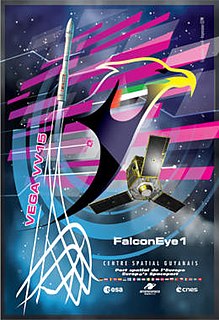
Ariane 5 is a European heavy-lift space launch vehicle developed and operated by Arianespace for the European Space Agency (ESA). It is launched from the Centre Spatial Guyanais (CSG) in French Guiana. It has been used to deliver payloads into geostationary transfer orbit (GTO) or low Earth orbit (LEO). The launch vehicle had a streak of 82 consecutive successful launches between 9 April 2003 and 12 December 2017. A direct successor system, Ariane 6, is in development.

Arianespace SA is a French company founded in 1980 as the world's first commercial launch service provider. It undertakes the operation and marketing of the Ariane programme. The company offers a number of different launch vehicles: the heavy-lift Ariane 5 for dual launches to geostationary transfer orbit, the Soyuz-2 as a medium-lift alternative, and the solid-fueled Vega for lighter payloads.

The Guiana Space Centre, also called Europe's Spaceport, is a European spaceport to the northwest of Kourou in French Guiana, a region of France in South America. Operational since 1968, it is particularly suitable as a location for a spaceport because of its equatorial location and open sea to the east.

Vega is an expendable launch system in use by Arianespace jointly developed by the Italian Space Agency (ASI) and the European Space Agency (ESA). Development began in 1998 and the first launch took place from the Centre Spatial Guyanais on 13 February 2012.

Soyuz-2 is a modernized version of the Soviet Soyuz rocket. In its basic form, it is a three-stage launch vehicle for placing payloads into low Earth orbit. Compared to the previous versions of the Soyuz, the first-stage boosters and two core stages feature uprated engines with improved injection systems. Digital flight control and telemetry systems allow the rocket to be launched from a fixed launch platform, whereas the launch platforms for earlier Soyuz rockets had to be rotated as the rocket could not perform a roll to change its heading in flight.

ELA-3, is a launch pad and associated facilities at the Centre Spatial Guyanais in French Guiana. ELA-3 is operated by Arianespace as part of the expendable launch system for Ariane 5 launch vehicles. As of December 2021, 112 launches have been carried out from it, the first of which occurred on 4 June 1996.
SEOSat-Ingenio, was a Spanish project to produce a satellite capable of providing wide-field imagery ensuring a repeat cycle of 38 days at 2.5 metre panchromatic resolution and 10 metre colour resolution, from a sun-synchronous polar orbit; it was Spain's first optical imaging satellite. The satellite was part of the Spanish Earth Observation Satellite program. The mission was funded by Spain's Centre for the Development of Industrial Technology (CDTI). SEOSat-Ingenio information was to be used by various Spanish civil, institutional or government users. However, under the Copernicus Programme of the European Union, it was also accessible to other European users, as well as to the Group on Earth observation of the Global Observing System of Earth.

Ariane 6 is a European expendable launch system currently under development since the early 2010s by ArianeGroup on behalf of the European Space Agency (ESA). It is intended to replace the Ariane 5, as part of the Ariane launch vehicle family. The stated motivation for Ariane 6 was to halve the cost compared to Ariane 5, and increase the capacity for the number of launches per year.

CERES is a space-based electronic signals intelligence (SIGINT) program by France's military consisting of three formation-flying satellites.

This article documents notable spaceflight events during the year 2020.

Vega flight VV06 is the Vega space launch of the LISA Pathfinder satellite.

Vega flight VV15 was the 15th flight of the Vega launcher, and its first failure.

Vega flight VV09 was the launch of the Sentinel-2B satellite by the 9th Vega launcher.

Vega flight VV13 was the launch of the Mohammed VI-B satellite by the 13th Vega launcher.

Vega flight VV16, also called SSMS PoC Flight, was the 16th launch of the Vega rocket. The launch was also notable as it was the first Vega launch following the accident of the VV15 launch in July 2019 that caused the loss of FalconEye1 satellite.

Vega flight VV17 was the 17th launch of the Vega rocket. The rocket failed after launch and the mission was lost.

Vega flight VV18 was the 18th launch of the Vega rocket.

Vega flight VV19 was the 19th launch of the Vega rocket.


















